I have always been very “girly” while growing up. I loved wearing dresses and make-up, putting pretty hairpins into my hair, and playing with Barbie. I have an older sister, so I may have been influenced by her, but I have always tended to like pretty things like flowers or sparkly objects. Even when playing with legos, I would make houses with flowers and only use the pink lego-person.
However, as I got older, my mother’s feminist views influenced me. During my mother’s generation in Korea, barely any women went to college--but she did. As a result, she married later than most other girls, and understood that a certain type of maturity came with having an education. She put this mentality into raising both my sister and I. We were to set an ambitious goal after going to college and marrying only after succeeding because that was the way to meeting a great man. Most importantly, we were taught to not allow our gender from preventing us from achieving success. As a violinist, she always compared me to boys and their physique. She always said that I had to work twice as hard compared to a boy because they were stronger physically and mentally. I had to practice longer hours and was not allowed to sacrifice violin to anything because she said that boys were goal-oriented and once they found their passion, they would never give it up--unlike girls. (I’m not sure if that is true, but that was definitely a motivating factor for me) As a result, I worked harder and became more ambitious. Through her I learned that women can become successful, but for a woman to do so, she needs to work harder than men because they are a stronger sex. But, the contradicting lesson was that all my hard work was ultimately to meet a great man to marry. The idea of marriage to my mother is still very much “traditional”, where marriage equals happiness.


This is an interesting example of how gender essentialism affect women in a positive and constructive way. Gender essentialism recognizes the fact that there are essentially differences between men and women which are natural and grounded in biology. Commonly, men are recognized as being the stronger, more capable sex, thus are expected to work harder and acquire high paying jobs as part of his role of primary breadwinner in life.
ReplyDeleteInterestingly, Esther's mother indeed perceives men as essentially more capable, however, instead of letting men do the "hard work", she sees it as a challenge for her to work harder as in order to compete with them.
Thus, instead of being a discouragement, gender essentialism here actually motivates the mother, who then passes this view to her daughter.
you have a great mother that taught you the positive attitude of being a success. This is an example of how a little girl to changed her mind though her mother experience and expectation.
ReplyDeleteGenerally, men are usually labelled more strong than women. thus this is no doubt that female should work hard twice than male.
Esther's gender biography is a really good example of she was shaped as a woman through her Korean culture. As part of her culture, women were perceived as not as mentally or physically as strong as men. Because this was part of Esther's gender stereotype through her culture, she naturally, along with her mother, have worked extra hard in school to go past that stereotype and be successful.
ReplyDeleteThis is also an example of essentialism, the belief that there are certain differences between men and women that are biological in origin. Women are generally labeled, stereotypically, as not being as strong as women, and that it's a biological difference. Some people also believe that men are smarter than women, as in Esther's Korean culture and in many other cultures as well.
In Esther's gender bio, the idea of culturally created gender roles comes into play; although, not in the typical sense. Since her mother went to college when most other women did not, she developed the viewpoint that women had to work harder than men in order to succeed on the same levels. This, of course, influenced her child rearing process when it came to raising Esther and her sister. By telling them to work twice as hard and set goals to achieve, Esther's mother ensured that Esther and her sister would not marry too early and become submissive to their husbands. Like Esther said at the end of her bio, the end result might have been "traditionalist," but the way of getting there (finding their own success) was obviously influenced by the way Esther's mother grew up.
ReplyDelete